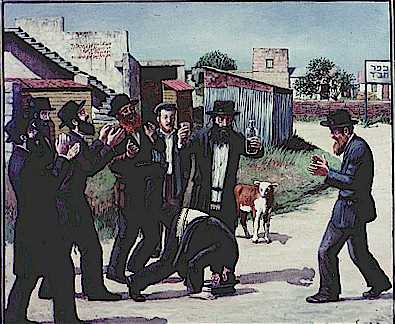Discouraged that Moshiach has not Come?
In the following dialog JDM wrote that he has a friend, who is begining to
become frum. He is concerned that she will burn out and become discouraged in
Moshiach does not come soon.
JDM: We do have a guarantee from Hashem that Mashiach will come....but that assumes the
belief in Hashem. I am sure that it can be proven, and I am not interested in getting into
that kind of discussion (not now during finals!). Part of the problem is that my friend is
getting discouraged, whether that is appropriate or not, that is the reality. That
discouragement has led to doubts in Mashiach, which then link back to doubts of Hashem.
Someone explained that there are things that we know and things that we believe. Mashiach
is one that we believe. What is a belief? A belief is something that we can not prove
until it happens. We believe in Techias Hameisim, and Mashiach, which means that until
they happen we can not prove them. The only possible proof is that things are fulfilling
prophecies, or that G-d has only fulfilled half of a promise so therefore he will fulfill
the second half. These are all good answers, but it can still leave doubts unless a person
decides to believe one way or the other. Take care.
Answer: Merrirus and Atzvus
There are lots of reasons for disapointment, discouragement, and despair in the world:
- Not finding a Shidduch
- Being a refusnik for many years.
- Being a Syrian Jew unable to emigrate.
- Being put in a concentration camp.
- Spending 210 years in slavery in Egypt.
- The delay in the arrival of the Moshiach
But because we have bitachon (trust) in the Eibishter (G-D) we do not allow these
disappointments overcome us, and chas-v'sholem certainly not doubt in HaShem.
Now, with respect to your friend, I have said that I felt that the dissapointment was a
sign of a positive healthy response, but let me be a bit more precise:
Chassidus explains that there are two types of dissapointment:
- Merrirus (bitterness)
- Atzvus (sadness)
Merrirus is a healthy response to the disapointments of the world. We are bothered by
our failures, bothered on Yom Kippur (or more frequently !) by our sins, upset at our
lazyness, or at the stupidty and cruelty of the world. The fact that we have been a
refusnik, slave, etc, for many years deeply hurts us. The question is what is our
response. Merrirus is a healthy response. It is the bitterness that leads to action. We
write letters about Soviet Jews, we make lists about how we are going to act better. We
take stock of our faults, and make resolutions.
 Aztvus on the other hand is closely connected (grammatically, and
according to Chassidus) with Atzlus (lazyness) it is the sadness that leads to depression
and inaction. It is the throwing up of one's hands, the lying under ones covers all day,
and the doubting in the Eibishter. One gives up looking for job interviews, and walks
around too depressed to take an active approach to tackling the problem.
Aztvus on the other hand is closely connected (grammatically, and
according to Chassidus) with Atzlus (lazyness) it is the sadness that leads to depression
and inaction. It is the throwing up of one's hands, the lying under ones covers all day,
and the doubting in the Eibishter. One gives up looking for job interviews, and walks
around too depressed to take an active approach to tackling the problem.
Perhaps you can convey this approach to your friend. That there are two ways to RESPOND
to the fact that Moshiach has not yet arrived. We don't stop saying the line in the
Shemonah Esrah: "Lshuasecha, kvisi kol Hayom" we don't stop hoping for the
comming of Moshiach. That is the atzvus (in the sense of abandonment) approach, which I
have characterized as immature. Instead, the appropriate response is merrirus. A
bitterness that leads to actions. Actions such as greater involvement in mitzvot, more
involvement in dispelling misconceptions about Moshiach (through more publicity, by making
oneself more knowledgable), more intention in one's davening and avodah.
If she would like, there is a four tape set that talks about Simcha, merrirus and
atzvus available from MACHON CHANA tapes by Rabbi Majeski. These tapes deal in a very
accesable way with how to deal with dissapointments, anger, etc. Machon Chana is a school
for women baaley teshuva in Crown Heights, and from what you are saying it seems like this
lecture series is geared exactly to womeon similiar to your friend. [Side issue: do women
have more problems with depression and sadness?]
 Author: Yechezkal-Shimon Gutfreund
Author: Yechezkal-Shimon Gutfreund
 Aztvus on the other hand is closely connected (grammatically, and
according to Chassidus) with Atzlus (lazyness) it is the sadness that leads to depression
and inaction. It is the throwing up of one's hands, the lying under ones covers all day,
and the doubting in the Eibishter. One gives up looking for job interviews, and walks
around too depressed to take an active approach to tackling the problem.
Aztvus on the other hand is closely connected (grammatically, and
according to Chassidus) with Atzlus (lazyness) it is the sadness that leads to depression
and inaction. It is the throwing up of one's hands, the lying under ones covers all day,
and the doubting in the Eibishter. One gives up looking for job interviews, and walks
around too depressed to take an active approach to tackling the problem.  Author: Yechezkal-Shimon Gutfreund
Author: Yechezkal-Shimon Gutfreund